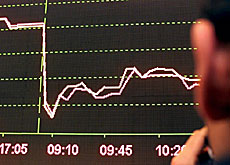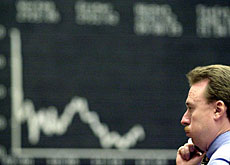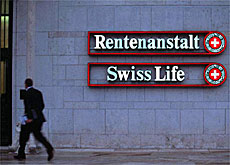SMI recovery triggers hopes of an upturn

The Swiss Market index (SMI) has climbed by over 30 per cent since March, fuelling hopes that the long running market decline may soon be over.
Peter Wuffli, president of Switzerland’s largest bank, UBS, hinted recently that the two-and-a-half year equity slump, or “bear market”, has eased.
However, he stopped short of declaring the recent upturn the beginning of a new bull market.
Swiss market experts remain divided about the consequences of the recent surge, which followed a sharp decline in markets during January and February.
The 27-stock SMI started the year at around 4,630 points, before slumping to 3,618 points in March, ahead of the war in Iraq.
Recently the benchmark index has been hovering around the 4,900 mark – a net increase of over three per cent for the first half of 2003.
Alfred Roelli, an economist with the Geneva private bank Pictet, told swissinfo that the recent improvement was evidence of a turnaround.
“This bear market was absolutely comparable to the last bear market, which happened in 1974-75,” Roelli said.
“The length is average, about two to two-and-a-half years and the size is fairly typical, around 45 per cent.”
Doubts
Roelli also said long-delayed capital spending, a key driver of economic growth, was starting to pick up after years of stagnation.
“You can’t put off capital spending for ever.”
Despite the up-beat assessment, others still see many risks that threaten the fragile recovery.
Harald Zahn, a SMI analyst at Credit Suisse, said there was little prospect that shares would enjoy big increases in the second half of 2003.
“It’s normal that after a bubble bursts you have rallies like this of 20 to 30 per cent,” Zahn said.
“For 2003 you can expect single-digit returns for equity markets, but not a lot more,” he added.
Reality check
Zahn said much of his scepticism about recent equity increases was based on the fact that while the SMI has risen sharply, the real economy continues to slide.
Unemployment in Switzerland remains relatively high at around 4 per cent, while growth is close to zero.
Gérard Piasko, chief investment officer at Julius Bär, told swissinfo that stock markets were neither under-valued nor over-valued.
“We will see whether the better mood of equity markets and people is really translating into higher consumer and corporate demand. But we don’t know yet,” Piasko said.
“So far economic numbers have been OK, [but] not better than expected. We’ll see if the nice rally is justified within the economy.”
Opportunities
Despite the caution, however, analysts said some sectors are worth investing in.
Roelli said companies with exposure to emerging markets, such as in Eastern Europe, are particularly attractive.
“There are two elements to our bullishness,” he said.
“Firstly we believe in a recovery in 2004, which is always good for emerging markets, and internally they are addressing their external debt and employment issues.
“Secondly, there are more and more emerging markets that are following the pattern set by Malaysia and others.”
By comparison, Roelli said that the recent increases in North American stock valuations had gone too far.
“That market tends to be richly valued,” he said. “[But] in Europe nearly a third of all companies are deeply undervalued, purely on the basis of cash-flow and balance sheets,” he added.
Vulnerable
While the recent signs of life have given long-suffering investors hope, the vulnerability of markets remains undiminished.
A terrorist attack on the West or a sudden rise in oil prices could again undermine confidence in stocks as investors seek “shelters” such as the Swiss franc, gold and bonds.
Roelli said the key was to maintain diversity within any investment portfolio.
“That’s common sense. For instance, we’re positive about emerging markets, but it doesn’t make up 20 or 30 per cent of our portfolio, it’s only five per cent. And if that doubles, you’re ahead.”
swissinfo, Jacob Greber in Zurich
The benchmark SMI has risen around 30 per cent since mid-March.
During the war in Iraq, the SMI reached a low of 3618 points.
Since January 1, the 26-stock index has gained around 3 per cent.

In compliance with the JTI standards
More: SWI swissinfo.ch certified by the Journalism Trust Initiative



You can find an overview of ongoing debates with our journalists here. Please join us!
If you want to start a conversation about a topic raised in this article or want to report factual errors, email us at english@swissinfo.ch.